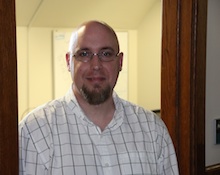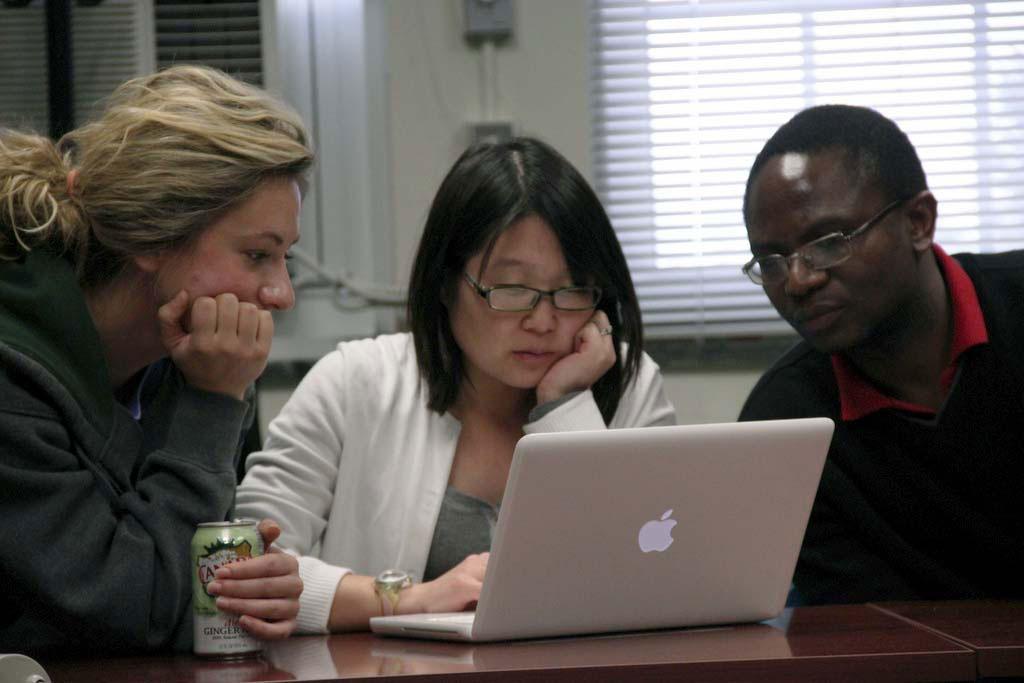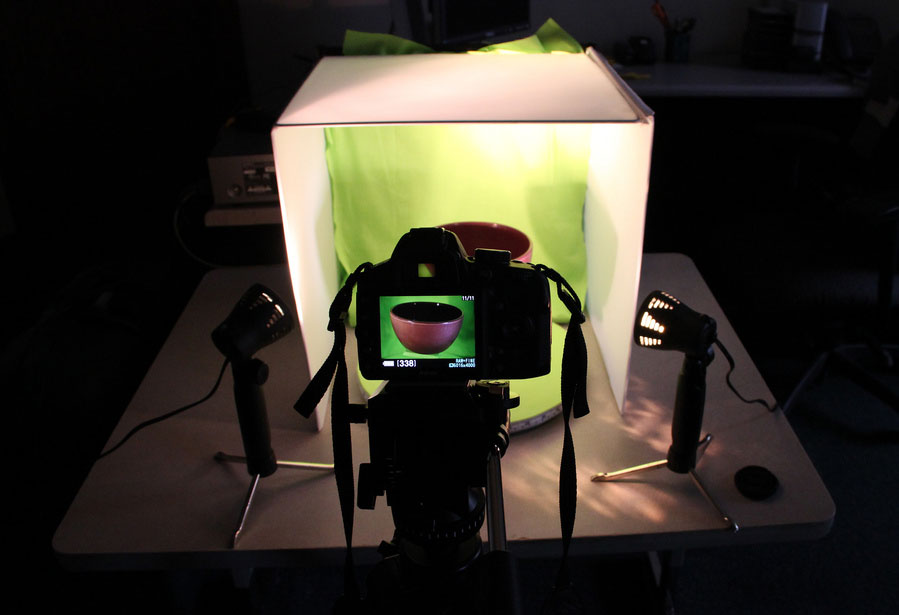Cultural Heritage Informatics Initiative at Michigan State University
Based in the Department of Anthropology at Michigan State University, the Cultural Heritage Informatics Initiative conducts an annual graduate fellowship program and a biennial fieldschool that provide students with instruction and opportunities to build individual or collaborative projects that advance the field of cultural heritage informatics. For more information, contact Ethan Watrall or visit the program’s website.
Mission
To equip graduate and undergraduate students with the technical, creative, and practical skills necessary to apply information, communication, and computing technologies to cultural heritage materials and questions, influence the current state of cultural heritage informatics, and become thought leaders for the future of the field.
Since its 2010 launch, the Cultural Heritage Informatics (CHI) Initiative has been a platform for interdisciplinary scholarly collaboration in the domain of Cultural Heritage Informatics at Michigan State University. The CHI Initiative has two primary activities. First, the Cultural Heritage Informatics Graduate Fellowship Program is designed to provide an opportunity for selected graduate students to collaboratively develop a significant and innovative cultural heritage informatics project. Through collaborative project development as well as guided instruction, fellows gain the theoretical and methodological skills necessary to creatively apply information, computing, and communication technologies to cultural heritage materials, questions, and problems.
The second major activity is the Cultural Heritage Informatics Fieldschool, an immersive five-week summer program offered every other year to graduate and undergraduate students, as well as existing professionals in the cultural heritage sector. Based on the pedagogical model of the archaeological fieldschool, the Cultural Heritage Informatics Fieldschool is an intensive theme-based program that leverages collaborative project development to teach skills needed to build applications and digital user experiences that serve the domain of cultural heritage—skills such as programming, media design, project management, user centered design, digital storytelling, and more.
People
Directed by Ethan Watrall, the CHI Graduate Fellowship Program comprises a small cohort of graduate students from disciplines related to cultural heritage, while the CHI Fieldschool is open to graduate and undergraduate students, as well as existing professionals.
Cultural Heritage Informatics Graduate Fellowships are open to MSU graduate students in departments and programs with an emphasis on cultural heritage, including Anthropology, History, Cultural Rhetorics, Art History, Museum Studies, Historical and Cultural Geography, Classics, and more. Students enter with varying levels of technical skills and familiarity with possibilities for digital scholarship, and create projects that contribute to their course of study. The interdisciplinary nature of the program enables students to conceptualize their work in a broader framework that transcends disciplinary boundaries.
The biennial Cultural Heritage Informatics Fieldschool admits a limited number of graduate and undergraduate students, and is also open to a limited number of non-students (specifically, professionals working in the field of cultural heritage, the digital humanities, information science, informatics, user centered design, user experience design, and similar fields). The CHI Fieldschool is directed by Ethan Watrall, and instruction is supplemented by a wide variety of guest speakers from from both MSU and beyond.

Ethan Watrall
The Cultural Heritage Informatics Initiative is directed by Ethan Watrall, who is also Assistant Professor in the Department of Anthropology and Associate Director of MATRIX: The Center for Digital Humanities and Social Sciences at Michigan State University. His research interests fall in the domain of digital archaeology, mobile cultural heritage, and serious games and meaningful play for cultural heritage learning, outreach, and engagement. Because of the proximate relationship between the CHI Initiative and MATRIX, fellows also benefit from the expertise of MATRIX staff.
Structure
The two key programs are graduate fellowships, year-long funded opportunities to develop digital projects and skills; and fieldschool, a five-week theme-based immersive program for instruction and collaborative project development.
During the one-year term of their fellowship, fellows receive a stipend of $2,000 per semester, as well as the opportunity to receive an additional $1,000 if they are appointed as assistants to the Cultural Heritage Informatics Fieldschool during the summer session. In addition, fellows receive $1,000 in travel funding in order to present their work and engage with the broader digital scholarly community at meetings, workshops, and conferences. The maximum total award is $6,000 for the year.
The details of each year are guided by the projects that the fellows conceptualize, which can be individual or collaborative. Fellows meet weekly for instruction, consultation, and discussion; as the year progresses, the weekly sessions shift from being fairly structured instructional meetings (covering such topics as project management, linked open data, and scholarly communication) toward more free-form brainstorming, project updates, and collective troubleshooting. Fellows are expected to publish regularly to the Cultural Heritage Informatics Initiative website, providing project updates as well as discussing broader issues of relevance in digital cultural heritage and cultural heritage informatics. This requirement encourages fellows to develop a sense of audience and public scholarship, while also clarifying their thinking about their process and projects. By the end of the year, fellows complete a white paper that is released to the public, publicly launch their project, and are encouraged to present the finished project in various scholarly venues.

Cultural Heritage Informatics Graduate Fellows collaborating during one of their weekly meetings.
The Cultural Heritage Informatics Fieldschool’s structure is centered on a tightly-focused immersive experience. Participants meet all day, five days a week, for five weeks. Students are challenged to work collaboratively in order to brainstorm and conceive of the projects they will work on throughout the session. The model allows students to integrate the “theoretical” portions of the fieldschool (design research, user centered design, best practices, etc.) with its applied (development) portions—thereby building applications that truly meet the needs of cultural heritage questions, challenges, and content.
Research
Fellows create innovative and vibrant digital projects that contribute new knowledge to their field of study, while also advancing the broader developments in cultural heritage informatics. Details about individual projects can be found on the CHI Initiative blog.
Fellows’ wide-ranging projects include a digital dissertation prototype, a mobile application for forensic anthropology and bioarchaeology methods, a digital archaeology repository for the Omani UNESCO World Heritage site of Bat, a born-digital publication exploring the materiality of the archive, and an online digital exhibit about settler colonialism in the American midwest and North Africa.
Fellows are encouraged to consider the place their project occupies in their larger disciplinary ecosystem, as well as that of cultural heritage informatics and digital cultural heritage. Fellows are also very strongly encouraged to consider the sustainability of their project beyond the context of the fellowship. Details about individual projects can be found on the CHI Initiative blog. Some projects conclude as the students complete their programs of study, while others are likely to see continued development over longer periods of time.
Capture station for stereophotogrammetry, or 3-D photography, at MATRIX: The Center for Digital Humanities & Social Sciences
Support
Supported by internal funding from the MSU Graduate School, the College of Social Science, the Department of Anthropology, the Department of History, the Department of Writing, Rhetoric, and American Cultures, and University Outreach and Engagement.
The Cultural Heritage Informatics Graduate Fellowship program is generously supported by the MSU Graduate School, The College of Social Sciences, the Department of Anthropology, the Department of History, the Department of Writing, Rhetoric, and American Cultures, and University Outreach and Engagement. The program is administered by the Department of Anthropology and hosted by MATRIX: The Center for Digital Humanities & Social Sciences. MATRIX is also committed to long term hosting and supporting fellows’ and fieldschool projects. The Cultural Heritage Informatics Fieldschool is offered and administered by the Department of Anthropology.
All technical infrastructure for both the Cultural Heritage Informatics Graduate Fellowship program and Fieldschool, including server space, domain, project management tools, and development environment, is provided by MATRIX: The Center for Digital Humanities & Social Sciences. MATRIX is also committed to long term hosting and supporting fellows’ and fieldschool projects.
While internal funding shows a strong institutional commitment to the program, the relatively short funding cycles (two year periods) mean that longevity remains a concern.
Directions
The program will be refined continually based on each year’s successes and challenges, as well as current best practices and development in the field, in order to create a sustainable and rigorous program in which fellows complete robust projects in their areas of interest.
Each year, Watrall refines the fellowship program based on lessons learned through the previous year’s cohort. He hopes to see a modest increase in the cohort size, as well as increased diversity of student backgrounds. He continues to improve the models for public engagement and presentation of the fellows’ work, and hopes to make that process more effective for fellows, who accomplish a great deal in a relatively short period. He hopes that the number and quality of the application pool continues to grow stronger as more graduate students see the importance of digital innovation in their work, and he hopes to frame future iterations of the Cultural Heritage Informatics Fieldschool so that it is more accessible to existing professionals. Other future goals include continuing to build strong cross-departmental connections, and integrating previous year’s fellows as mentors for current fellows.
Nuts & Bolts
Consider how to evaluate process-oriented work, and how the credits that students earn will counted by their departments. Also, keep in mind that certain disciplinary methods and paradigms may be unfamiliar for students.
Considering developing a similar program? There are a number of advantages and tradeoffs of housing your initiative within a department, particularly if you hope to include students from multiple disciplines:
- If the program will be credit-bearing, as the fieldschool is, will the credits be useful to participants from other departments? What disciplinary methods might be unfamiliar to outside students?
- How do you appropriately set expectations and evaluate projects given students’ differing technical skills at the outset of the program?
- If a project is not completed by the end of the term, how will you assess progress, and how will you encourage students to continue moving toward their project goals after the fellowship period?